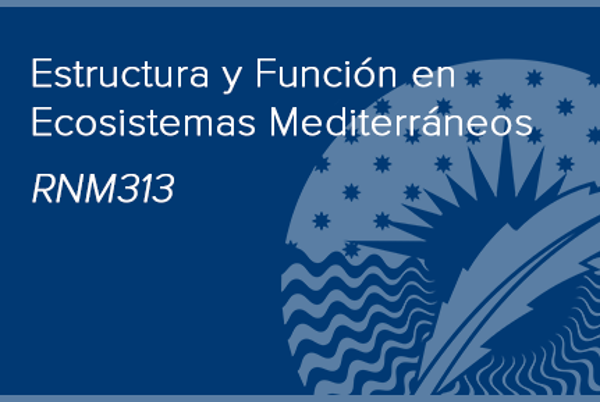Estructura y Función en Ecosistemas Mediterráneos
ESTRUCTURA Y FUNCIÓN EN ECOSIS


Instituto de Recursos Naturales y Agrobiología de Sevilla
Sevilla, EspañaPublicaciones en colaboración con investigadores/as de Instituto de Recursos Naturales y Agrobiología de Sevilla (188)
2025
-
Coexistence of vascular plants and biocrusts under changing climates and their influence on ecosystem carbon fluxes
Agricultural and Forest Meteorology, Vol. 360
-
Soil function-microbial diversity relationship is impacted by plant functional groups under climate change
Soil Biology and Biochemistry, Vol. 200
2024
-
A transition from arbuscular to ectomycorrhizal forests halts soil carbon sequestration during subtropical forest rewilding
Science of the Total Environment, Vol. 946
-
Aboveground and belowground biodiversity have complementary effects on ecosystem functions across global grasslands
PLoS Biology, Vol. 22, Núm. 8
-
Accumulation of soil microbial extracellular and cellular residues during forest rewilding: Implications for soil carbon stabilization in older plantations
Soil Biology and Biochemistry, Vol. 188
-
Application of biogas-slurry and biochar improves soil multifunctionality in a poplar plantation during afforestation processes
Plant and Soil, Vol. 501, Núm. 1-2, pp. 107-123
-
Aridity drives the response of soil total and particulate organic carbon to drought in temperate grasslands and shrublands
Science advances, Vol. 10, Núm. 40, pp. eadq2654
-
Aridity thresholds of microbiome-soil function relationship along a climatic aridity gradient in alpine ecosystem
Soil Biology and Biochemistry, Vol. 192
-
Biocrusts drive soil respiration across seasons and depths in a cold-winter desert
Soil Biology and Biochemistry, Vol. 191
-
Biocrusts enhance soil organic carbon stability and regulate the fate of new-input carbon in semiarid desert ecosystems
Science of the Total Environment, Vol. 918
-
Biotic and abiotic responses to soilborne pathogens and environmental predictors of soil health
Soil Biology and Biochemistry, Vol. 189
-
Class-wide genomic tendency throughout specific extremes in black fungi
Fungal Diversity, Vol. 125, Núm. 1, pp. 121-138
-
Closing the gap between climate regulation and food security with nano iron oxides
Nature Sustainability, Vol. 7, Núm. 6, pp. 758-765
-
Conservation agriculture improves soil health and sustains crop yields after long-term warming
Nature Communications , Vol. 15, Núm. 1
-
Contrasting patterns for bacteria and archaea in response to salt stress across alpine wetlands of the Tibetan Plateau
Fundamental Research
-
Correction to: Hotspots of biogeochemical activity linked to aridity and plant traits across global drylands (Nature Plants, (2024), 10, 5, (760-770), 10.1038/s41477-024-01670-7)
Nature Plants
-
Correction to: Soil health is associated with higher primary productivity across Europe (Nature Ecology & Evolution, (2024), 10.1038/s41559-024-02511-8)
Nature Ecology and Evolution
-
Cyanobacterial and moss biocrusts shape soil nematode community in dryland mountain ecosystems with increasing aridity
Science of the Total Environment, Vol. 931
-
Deciphering microbiomes dozens of meters under our feet and their edaphoclimatic and spatial drivers
Global Change Biology, Vol. 30, Núm. 1
-
Deforestation impacts soil biodiversity and ecosystem services worldwide
Proceedings of the National Academy of Sciences of the United States of America, Vol. 121, Núm. 13